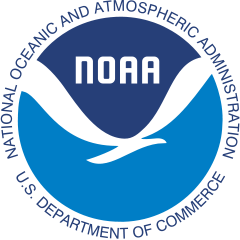July 23rd, 2024
GFDL recognizes National Intern Day and celebrates the contributions of our gifted interns. This year, in partnership with Princeton University, GFDL welcomed its largest group ever—23 talented students from a range of internship programs, such as NOAA’s Educational Partnership Program with Minority Serving Institutions Cooperative Science Centers, NOAA Experiential Research and Training Opportunities, the Ernest F. Hollings Undergraduate Scholarship Program, the William M. Lapenta Student Internship Program, the Cooperative Institute for Modeling the Earth System, and other programs.
Featured below are 3 aspiring scientists from NOAA Cooperative Science Centers. Since 2000, NOAA’s Educational Partnership Program with Minority Serving Institutions Cooperative Science Centers has trained numerous students, equipping them with the expertise and skills to contribute to NOAA’s mission-driven enterprise. This summer GFDL staff and scientists have had the pleasure of hosting three fellows from this program: Stephanie Ortiz Rosario, Carlos Ordaz, and Benaya Berhane.

Stephanie Ortiz Rosario of Cayey, Puerto Rico, is a fellow from the NOAA Center for Atmospheric Science and Meteorology II. She is a rising senior at University of Puerto Rico at Mayagüez, studying theoretical physics with a concentration in meteorology. She is focusing on extreme tropical precipitation and is co-mentored by Veeshan Narinesingh, Andrew Williams, Nadir Jeevanjee, Tim Merlis, and Gaby Negrete Garcia. Stephanie heard about GFDL when she attended an event in the NOAA booth at the annual American Meteorology Society meeting. To her, GFDL seemed like, “a nice community interested in mentoring me not just in science but in terms of my overall growth as a person.” So far, she says working at GFDL has been a growth experience in terms of both her research and professional development. She plans to pursue a Ph.D. but after that, “ I could definitely see myself coming back to GFDL one day continuing my work with cloud resolving simulations and climate.” According to Stephanie, “it’s been really nice working with my mentors, they are very supportive and helped me realize I am not alone in this!”
Carlos Ordaz of Tijuana, Mexico and San Diego, California is a Ph.D. fellow from the NOAA Center For Earth System Sciences and Remote Sensing Technologies II. He studies physics at City University of New York. Carlos took a different path, having worked in a variety of roles, such as bus driver, taco store cashier, and structural engineer. Eventually, he decided to pursue the passion for physics that he’d had since childhood. Carlos learned about NOAA and GFDL from an outreach event, and his Ph.D. advisor told him that, “to apply your passion and expertise in physics to climate problems, one of the best places to do that is GFDL.” With his GFDL mentor, Nadir Jeevanjee, Carlos has done some preliminary work to investigate the physical drivers of precipitation distribution changes in a warming climate, as part of his Ph.D. thesis.
Benaya Berhane of Laurel, Maryland is also an undergraduate fellow from the NOAA Center for Atmospheric Science and Meteorology II. He is a rising senior at University of Maryland, Baltimore County, studying information systems. Benaya has been researching climate model representation of heat waves in Eritrea, a country in northeastern Africa where his parents are from. Benaya is co-mentored by Tara McQueen, Ryan Kramer, Veeshan Narinesingh, Carl Wright, and Levin Carn. Benaya described his experience as, “very welcoming”, saying, “I’ve felt very supported by not only my mentors but also the broader GFDL community. I enjoy how passionate everybody is about their work. It inspires you to find something that you are passionate about.” For the future, he sees NOAA as a possibility because, “I’d like to bridge the gaps between science and technology and NOAA is an organization that has goals I would like to support regarding climate change.”
The passion, hard work, and fresh perspectives brought by these interns have not only advanced the lab’s research projects but have also brought a refreshing energy into daily work at GFDL. Their contributions this summer are a testament to the vital role of comprehensive and diverse educational programs in cultivating the next generation of climate scientists.


